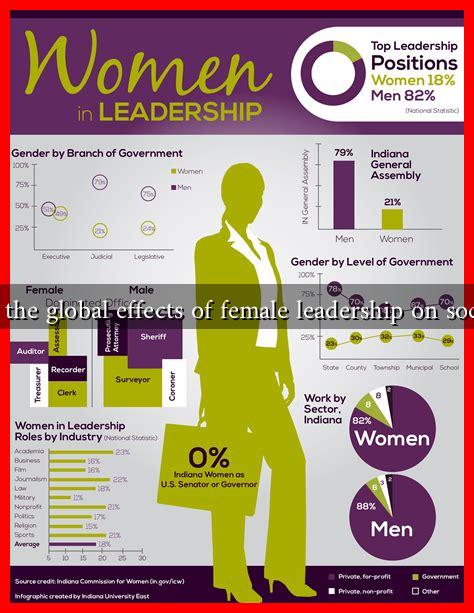-
Table of Contents
What are the Global Effects of Female Leadership on Social Issues
In recent years, the conversation surrounding female leadership has gained significant traction, particularly in the context of social issues. As more women ascend to leadership roles across various sectors, their influence on social policies, community development, and overall societal well-being becomes increasingly evident. This article explores the global effects of female leadership on social issues, highlighting key areas where women in power have made a substantial impact.
The Importance of Female Leadership
Female leadership is not just about gender representation; it is about bringing diverse perspectives to decision-making processes. Research indicates that organizations with women in leadership roles tend to perform better financially and socially. According to a McKinsey report, companies in the top quartile for gender diversity on executive teams are 21% more likely to outperform their peers in terms of profitability.
Impact on Social Issues
Female leaders have been instrumental in addressing various social issues, including education, health care, and gender equality. Their unique experiences and perspectives often lead to more comprehensive and inclusive policies. Here are some key areas where female leadership has made a significant impact:
- Education: Women leaders prioritize education as a fundamental right. For instance, Malala Yousafzai, a Nobel laureate, has championed girls’ education globally, advocating for policy changes that ensure access to education for all girls, especially in developing countries.
- Health Care: Female leaders often focus on health care reforms that address women’s health issues. Jacinda Ardern, the former Prime Minister of New Zealand, implemented policies that improved maternal health care and mental health services, showcasing how female leadership can lead to better health outcomes.
- Gender Equality: Women in leadership positions are more likely to advocate for gender equality. For example, Angela Merkel, the former Chancellor of Germany, played a crucial role in promoting women’s rights and gender equality in the workplace, leading to significant legislative changes in Germany.
Case Studies of Female Leadership
Several case studies illustrate the positive effects of female leadership on social issues:
- Rwanda: Following the genocide in 1994, Rwanda has seen a remarkable transformation under female leadership. Women hold over 60% of the seats in the Rwandan parliament, the highest percentage in the world. This representation has led to progressive policies on health, education, and economic development, significantly improving the quality of life for Rwandans.
- Finland: Finland’s government, led by Prime Minister Sanna Marin, has prioritized social welfare policies that address climate change, education, and gender equality. Marin’s leadership style emphasizes collaboration and inclusivity, resulting in policies that benefit all citizens.
- New Zealand: Under Jacinda Ardern’s leadership, New Zealand implemented a “Wellbeing Budget” that focuses on mental health, child poverty, and domestic violence. This approach reflects a shift from traditional economic metrics to a more holistic view of societal well-being.
Statistics Supporting Female Leadership
Numerous studies and statistics underscore the positive impact of female leadership on social issues:
- According to a study by the Peterson Institute for International Economics, having more women in leadership positions can increase a company’s profitability by up to 15%.
- The World Economic Forum’s Global Gender Gap Report 2021 indicates that countries with higher female representation in government tend to have better outcomes in health and education.
- A report by the United Nations Development Programme (UNDP) found that countries with women in leadership roles are more likely to prioritize social issues such as poverty reduction and education.
Conclusion
The global effects of female leadership on social issues are profound and far-reaching. As women continue to break barriers and assume leadership roles, their contributions to education, health care, and gender equality are reshaping societies for the better. The evidence is clear: female leadership not only enhances organizational performance but also drives social progress. As we move forward, it is crucial to support and promote women in leadership positions to ensure a more equitable and just world for all.
For further reading on the impact of female leadership, you can explore resources from the United Nations Women and the McKinsey & Company.

